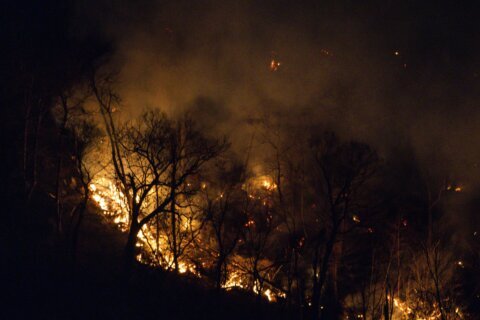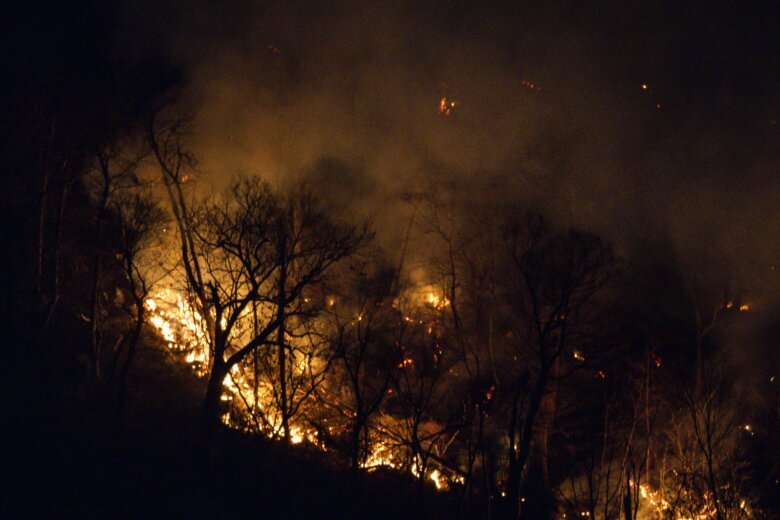
Firefighters in New York said Sunday that a voluntary evacuation overnight helped them protect more than 160 homes from a stubborn wildfire near the New Jersey border as officials in much of the Northeast coped with hundreds of brush fires in tinder-dry and windy conditions.
Communities in New England dealt with a similar surge in late fall fires, and many parts of the Northeast remained under red flag alerts this weekend. Across the country, California made good progress against a 32-square-mile (83-square-kilometer) fire in Ventura County that has destroyed more than 245 structures, most of them houses. The Mountain fire was 95% contained.
Windy conditions renewed a wildfire Saturday that escaped a containment line and prompted emergency officials to enact the voluntary evacuation plan affecting about 165 houses in Warwick, New York, near the New Jersey border. No structures were in danger as of Sunday afternoon as firefighters worked to tame the Jennings Creek blaze, New York Parks Department spokesman Jeff Wernick said. The voluntary evacuation will remain in place at least until Monday, Wernick said.
The wildfire had burned 7 1/2 square miles (19.4 square kilometers) across the two states as of Friday and was burning primarily in New York’s Sterling Forest State Park, where the visitor center, the lakefront area at Greenwood Lake and a historic furnace area remained open. Woodland activities including hunting were halted, Wernick said.
It was 90% contained on the Passaic County, New Jersey, side of the border, and about 88% contained in Orange County, New York, where a state of emergency was extended on Sunday, officials said. New York Army National Guard and state police helicopters dropped water on the blaze to support ground crews’ efforts.
“Residents in the voluntary evacuation area are asked to continue sheltering so that crews can effectively suppress the fire,” according to a statement posted on Facebook by village officials in Greenwood Lake, New York, where schools will be closed on Monday. “There is currently no threat to structures but crews are actively working to ensure structure protection.”
The blaze claimed the life of an 18-year-old New York parks employee who died when a tree fell on him as he helped fight the fire in Sterling Forest on Nov. 9. The fire’s cause remains under investigation.
New York City’s Fire Department is creating its first-ever brush fire task force to respond to what officials say is a historic increase in brush fires throughout the city’s five boroughs, Commissioner Robert S. Tucker announced Sunday. From Nov. 1 to Nov. 14, the FDNY responded to 271 brush fires, marking the highest two-week period in New York’s history.
The task force will be made up of fire marshals, fire inspectors and tactical drone units in an effort to ensure rapid responses to brush fires and to help with investigations to determine their cause.
“Due to a significant lack of rainfall, the threat of fast-spreading brush fires fueled by dry vegetation and windy conditions have resulted in an historic increase of brush fires throughout New York City,” Tucker said in a statement.
In Massachusetts, which typically has about 15 wildland fires every October, there have been about 200 this year. State officials said more fires were expected because of weather conditions and dry surface fuels.
The National Weather Service in Boston warned Sunday that elevated fire risk continued across southern New England, given gusty winds and dry conditions. In Connecticut, a portion of Interstate 84 in Plainville was closed briefly Sunday because of a brush fire.
A volunteer firefighter in Haddam, Connecticut, was injured Saturday while fighting a fast-spreading brush fire sparked by downed power lines. The firefighter was treated at a hospital and released, according to a Facebook post by the Haddam Volunteer Fire Company.
Much-needed rain was predicted for Thursday in the region.
In southern New Hampshire, the fire danger risk was “very high,” state officials said.
The Maine Forest Service said the southern part of the state also faced high fire danger. Most of the state was abnormally dry or facing moderate drought conditions.
Some relief could be in sight in New York. The National Weather Service in Albany said Sunday that most of the region could see a “widespread soaking rain” of 0.5 to 1.5 inches beginning Wednesday night.
Copyright © 2024 The Associated Press. All rights reserved. This material may not be published, broadcast, written or redistributed.







